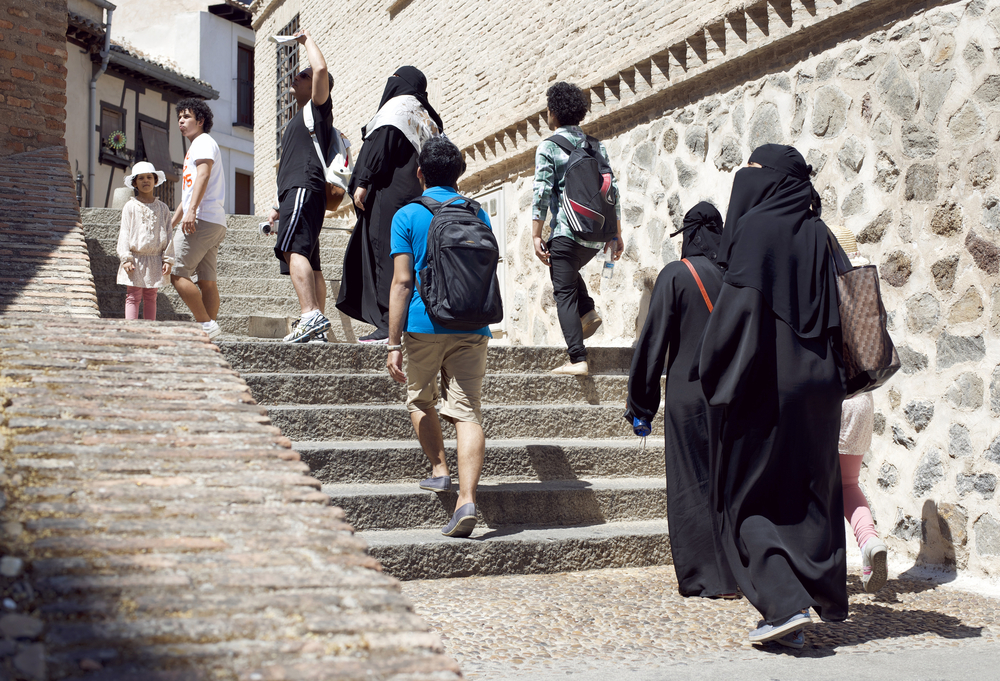Muslim-friendly travel: Malaysia lead over UAE narrows, Bahrain, Indonesia gain ground on leaders - study
Photo: Arab tourists walking the old streets of Toledo, Spain on August 15, 2013. Spain's efforts to improve its Muslim-friendly travel ecosystem has bumped it up into the top 10 non-OIC destinations on the Global Muslim Travel Index 2017. Spain ranks 37th globally and 10th on the non-OIC ranking. Olga Lutina / Shutterstock.com
Malaysia and the United Arab Emirates (UAE) retain top spots as the Muslim-friendliest destinations on the Global Muslim Travel Index (GMTI) 2017 but the gap between the two is fast narrowing.
The Muslim-friendliness of the two destinations serves as global benchmarks for the travel economy and Malaysia advices other countries on the development of their Islamic tourism ecosystems through the Malaysian Technical Cooperation Program. For the UAE, Dubai has invested heavily since 2013 to work towards its ambition of becoming the world’s capital of the Islamic economy.
The annual GMTI, published by Mastercard and Singapore-based halal travel specialist CrescentRating covers 130 destinations for four key strategic criteria: 1) Access, 2) Communications, 3) Environment, and 4) Services. These are further divided into 11 sub-sections including Muslim arrivals, air connectivity, visa restrictions, suitability as a family holiday destination, and accommodation options.

Data source: Mastercard-CrescentRating Global Muslim Travel Index 2017
Dubai’s efforts may be paying off for the UAE as its rate of growth across three indicators—Muslim travel needs and awareness, airport facilities, and Muslim visitor arrivals—has narrowed Malaysia’s overall lead from 7.2 in 2016 to 5.6 this year.

Data source: Mastercard-CrescentRating Global Muslim Travel Index 2017
The two countries are neck and neck for Muslim traveller and general safety, and access to prayer spaces, while Malaysia has a sizeable lead on visa-free travel; Muslim travel needs, awareness and outreach; family-friendly destination; and Muslim visitor arrivals.

Data source: Mastercard-CrescentRating Global Muslim Travel Index 2017
Other countries are also improving their Muslim-friendliness. Indonesia has leapfrogged Turkey to take the third spot on the index with growth in Muslim travel needs awareness and outreach, accommodation options, airport facilities, air connectivity, dining options and halal assurance, and visa-free travel.

Data source: Mastercard-CrescentRating Global Muslim Travel Index 2017
Of the top 10 countries in the 2017 ranking, Bahrain has improved the most—2.6 points since 2016—to move up two places to ninth. It has improved most for airport facilities, Muslim traveller and general safety, air connectivity, and visa-free travel.

Data source: Mastercard-CrescentRating Global Muslim Travel Index 2017
NON-OIC DESTINATIONS
Singapore is the only non-Organisation of Islamic Cooperation (OIC) country in the top 10 global ranking. However, its score dipped 1.1 points since last year following a drop in Muslim visitor arrivals. The city-state improved on air connectivity, and visa-free travel.
Thailand, the United Kingdom, South Africa and Hong Kong round up the top five Muslim-friendliest non-OIC countries. Japan moved up two places to sixth among non-OIC rankings and Spain enters the top 10, at number 10, for the first time.Â
GLOBAL MARKET
The study revealed that in 2016, there was an estimated 121 million Muslim visitor arrivals globally, a growth of 3.4 percent from the previous year. This demographic spent around $155 billion last year.
Two key megatrends were identified as driving Muslim-friendly travel: the millennial and Generation Z demographic, and technology that will increase access to travel information.
© SalaamGateway.com 2017 All Rights Reserved
